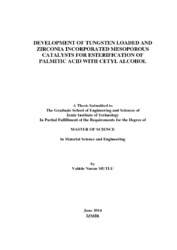Please use this identifier to cite or link to this item:
https://hdl.handle.net/11147/4184| Title: | Development of Tungsten Loaded and Zirconia Incorporated Mesoporous Catalysts for Esterification of Palmitic Acid With Cetyl Alcohol | Other Titles: | Palmitik Asitin Setil Alkol ile Esterifikasyonu için Tungsten Yüklü Zirkonya İçeren Mezogözenekli Katalizörlerin Geliştirilmesi | Authors: | Mutlu, Vahide Nuran | Advisors: | Yilmaz, Selahattin | Keywords: | Catalytic reaction Acid catalysts Esterification Catalytic materials Mesoporous catalysts |
Publisher: | Izmir Institute of Technology | Abstract: | In this study, it was pursued to develop acidic mesoporous catalysts for esterification of cetyl alcohol by palmitic acid. For this, Zr incorporated SBA-15 was prepared by hydrothermal synthesis. Zr-SBA-15 was used both as a catalyst support and as a catalyst itself. WO3 loading onto the Zr-SBA-15 was performed by incipient wetness impregnation. Additionally, WO3-ZrO2 catalyst was prepared by co-precipitation with two different contents of WO3 (15 wt% and 20 wt%). The reaction tests were carried out in mesitylene under reflux conditions. Zr was incorporated into SBA-15 successfully. The surface areas of Zr-SBA-15 and WO3/Zr-SBA-15 catalysts were significantly higher than that of WO3-ZrO2. Loading of WO3 decreased the surface area of Zr-SBA-15. The acidity of the WO3/Zr-SBA-15 with 15 wt% WO3 was higher than that of with 20 wt% WO3. Moreover, increasing the calcination temperature from 700 to 800 oC resulted in the increase of acidity. The activity of the catalysts differed. The only product obtained was cetyl palmitate. Under the test conditions it was found that the reaction rate was not limited by equilibrium. Zr-SBA-15 provided the highest conversion (64 %) which corresponded to cetyl palmitate yield of 63% among other mesoporous catalysts because of its high surface area (600.3 m2/g) and acidity (0.152 mmol NH3/g cat). This catalyst did not show leaching. WO3/Zr-SBA-15 based catalys tests showed that catalyst activity increased by increasing calcination temperature. This was atributed to better dispersion of W. The conversion of cetyl alcohol did not change much with more W loading. | Description: | Thesis (Master)--Izmir Institute of Technology, Materials Science and Engineering, Izmir, 2014 Includes bibliographical references (leaves: 44-45) Text in English; Abstract: Turkish and English xi, 47 leaves |
URI: | http://hdl.handle.net/11147/4184 |
| Appears in Collections: | Master Degree / Yüksek Lisans Tezleri |
Files in This Item:
| File | Description | Size | Format | |
|---|---|---|---|---|
| 10013410.pdf | MasterThesis | 1.91 MB | Adobe PDF |  View/Open |
CORE Recommender
Page view(s)
204
checked on Apr 21, 2025
Download(s)
202
checked on Apr 21, 2025
Google ScholarTM
Check
Items in GCRIS Repository are protected by copyright, with all rights reserved, unless otherwise indicated.